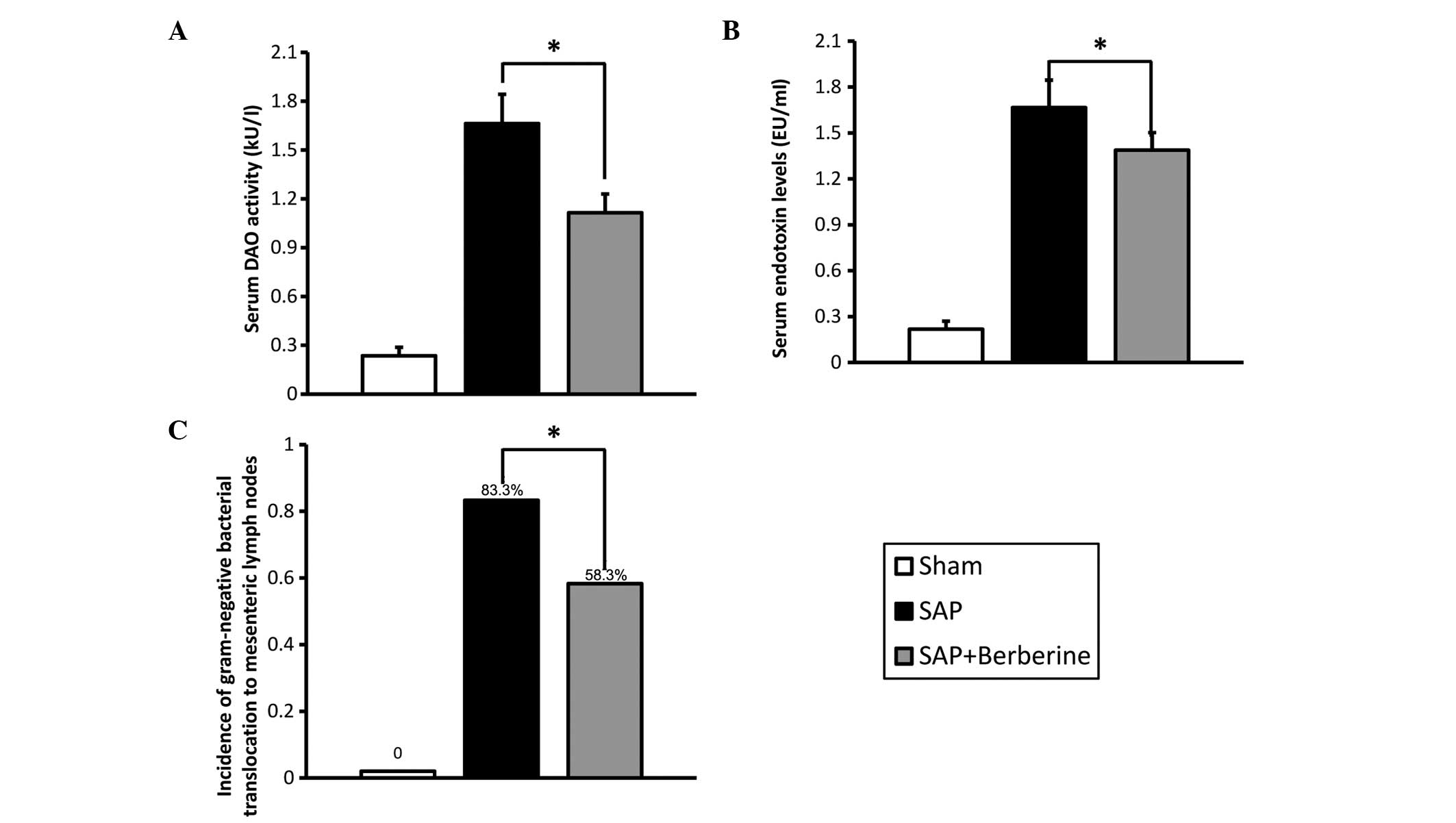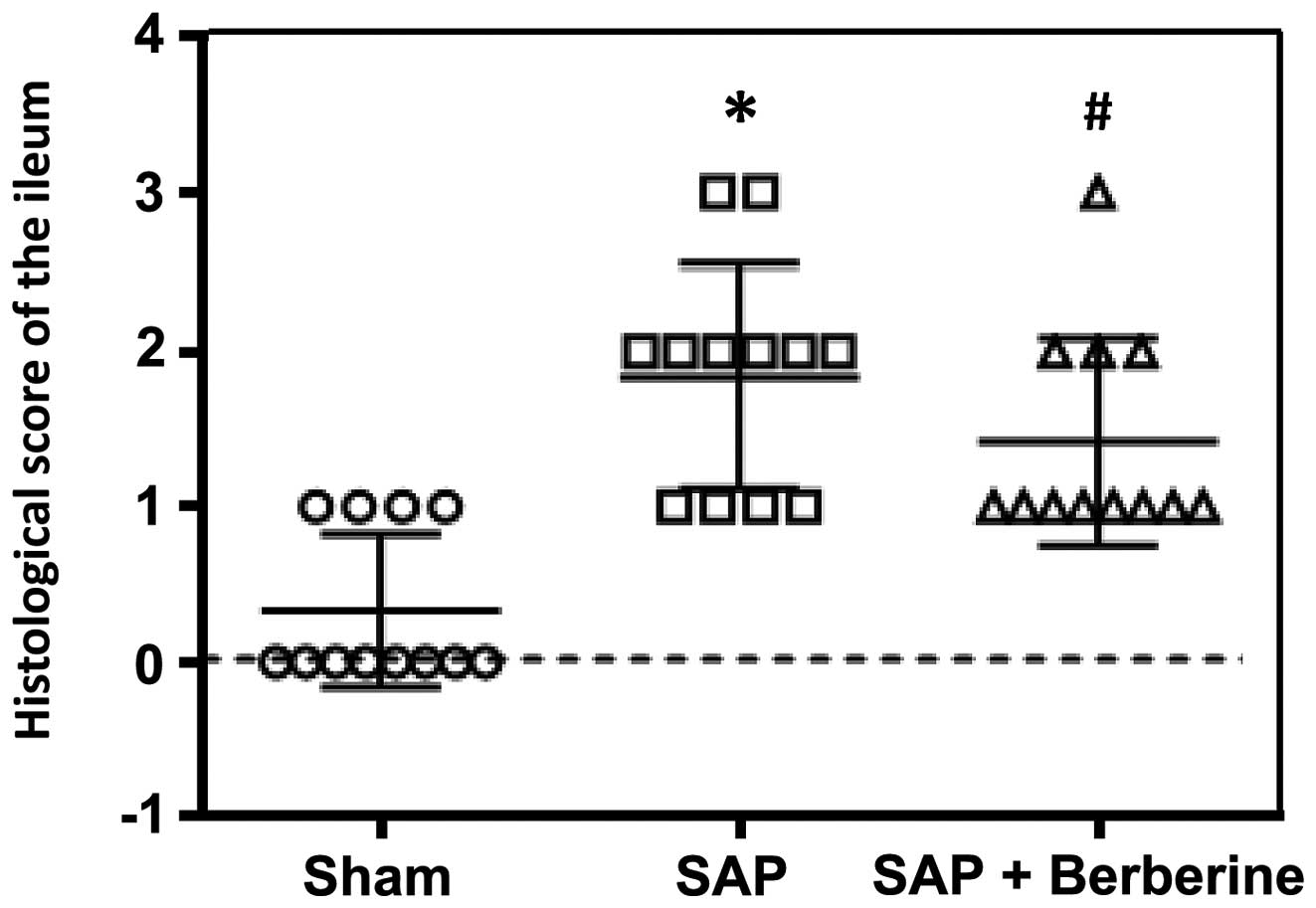|
1
|
Morel DR, Frossard JL, Cikirikcioglu B,
Tapponnier M and Pastor CM: Time course of lung injury in rat acute
pancreatitis. Intensive Care Med. 32:1872–1880. 2006. View Article : Google Scholar : PubMed/NCBI
|
|
2
|
Lankisch PG and Lerch MM: Pharmacological
prevention and treatment of acute pancreatitis: where are we now?
Dig Dis. 24:148–159. 2006. View Article : Google Scholar : PubMed/NCBI
|
|
3
|
Zhang XP, Zhang J, Song QL and Chen HQ:
Mechanism of acute pancreatitis complicated with injury of
intestinal mucosa barrier. J Zhejiang Univ Sci B. 8:888–895. 2007.
View Article : Google Scholar : PubMed/NCBI
|
|
4
|
Gurleyik E, Coskun O, Ustundag N and
Ozturk E: Prostaglandin E1 maintains structural integrity of
intestinal mucosa and prevents bacterial translocation during
experimental obstructive jaundice. J Invest Surg. 19:283–289. 2006.
View Article : Google Scholar
|
|
5
|
Suzuki T: Regulation of intestinal
epithelial permeability by tight junctions. Cell Mol Life Sci.
70:631–659. 2013. View Article : Google Scholar : PubMed/NCBI
|
|
6
|
Camilleri M, Madsen K, Spiller R,
Greenwood-Van Meerveld B and Verne GN: Intestinal barrier function
in health and gastrointestinal disease. Neurogastroenterol Motil.
24:503–512. 2012. View Article : Google Scholar : PubMed/NCBI
|
|
7
|
Boberek JM, Stach J and Good L: Genetic
evidence for inhibition of bacterial division protein FtsZ by
berberine. PLoS One. 5:e137452010. View Article : Google Scholar : PubMed/NCBI
|
|
8
|
Saha P, Bhattacharjee S, Sarkar A, Manna
A, Majumder S and Chatterjee M: Berberine chloride mediates its
anti-leishmanial activity via differential regulation of the
mitogen activated protein kinase pathway in macrophages. PLoS One.
6:e184672011. View Article : Google Scholar : PubMed/NCBI
|
|
9
|
Wang L, Liu L, Shi Y, et al: Berberine
induces caspase-independent cell death in colon tumor cells through
activation of apoptosis-inducing factor. PLoS One. 7:e364182012.
View Article : Google Scholar : PubMed/NCBI
|
|
10
|
Yan F, Wang L, Shi Y, et al: Berberine
promotes recovery of colitis and inhibits inflammatory responses in
colonic macrophages and epithelial cells in DSS-treated mice. Am J
Physiol Gastrointest Liver Physiol. 302:G504–G514. 2012. View Article : Google Scholar : PubMed/NCBI
|
|
11
|
Lee IA, Hyun YJ and Kim DH: Berberine
ameliorates TNBS-induced colitis by inhibiting lipid peroxidation,
enterobacterial growth and NF-κB activation. Eur J Pharmacol.
648:162–170. 2010.PubMed/NCBI
|
|
12
|
Feng AW, Gao W, Zhou GR, et al: Berberine
ameliorates COX-2 expression in rat small intestinal mucosa
partially through PPARγ pathway during acute endotoxemia. Int
Immunopharmacol. 12:182–188. 2012.PubMed/NCBI
|
|
13
|
Li HM, Wang YY, Wang HD, et al: Berberine
protects against lipopolysaccharide-induced intestinal injury in
mice via alpha 2 adrenoceptor-independent mechanisms. Acta
Pharmacol Sin. 32:1364–1372. 2011. View Article : Google Scholar : PubMed/NCBI
|
|
14
|
Gu L, Li N, Gong J, Li Q, Zhu W and Li J:
Berberine ameliorates intestinal epithelial tight-junction damage
and down-regulates myosin light chain kinase pathways in a mouse
model of endotoxinemia. J Infect Dis. 203:1602–1612. 2011.
View Article : Google Scholar
|
|
15
|
Chiu CJ, McArdle AH, Brown R, Scott HJ and
Gurd FN: Intestinal mucosal lesion in low-flow states. I A
morphological, hemodynamic, and metabolic reappraisal. Arch Surg.
101:478–483. 1970. View Article : Google Scholar : PubMed/NCBI
|
|
16
|
Chiu CJ, Scott HJ and Gurd FN: Intestinal
mucosal lesion in low-flow states. II The protective effect of
intraluminal glucose as energy substrate. Arch Surg. 101:484–488.
1970. View Article : Google Scholar : PubMed/NCBI
|
|
17
|
Samak G, Suzuki T, Bhargava A and Rao RK:
c-Jun NH2-terminal kinase-2 mediates osmotic stress-induced tight
junction disruption in the intestinal epithelium. Am J Physiol
Gastrointest Liver Physiol. 299:G572–G584. 2010. View Article : Google Scholar : PubMed/NCBI
|
|
18
|
Strauman MC, Harper JM, Harrington SM,
Boll EJ and Nataro JP: Enteroaggregative Escherichia coli
disrupts epithelial cell tight junctions. Infect Immun.
78:4958–4964. 2010.PubMed/NCBI
|
|
19
|
Anderson RC, Cookson AL, McNabb WC, et al:
Lactobacillus plantarum MB452 enhances the function of the
intestinal barrier by increasing the expression levels of genes
involved in tight junction formation. BMC Microbiol. 10:3162010.
View Article : Google Scholar
|
|
20
|
Turner JR: Intestinal mucosal barrier
function in health and disease. Nat Rev Immunol. 9:799–809. 2009.
View Article : Google Scholar : PubMed/NCBI
|
|
21
|
Shen L, Weber CR, Raleigh DR, Yu D and
Turner JR: Tight junction pore and leak pathways: a dynamic duo.
Annu Rev Physiol. 73:283–309. 2011. View Article : Google Scholar : PubMed/NCBI
|
|
22
|
Kahl S and Mayer JM: Update on
experimental acute pancreatitis. Minerva Gastroenterol Dietol.
58:355–363. 2012.
|
|
23
|
Lerch MM and Gorelick FS: Models of acute
and chronic pancreatitis. Gastroenterology. 144:1180–1193. 2013.
View Article : Google Scholar : PubMed/NCBI
|
|
24
|
Mayerle J, Dummer A, Sendler M, et al:
Differential roles of inflammatory cells in pancreatitis. J
Gastroenterol Hepatol. 27(Suppl 2): 47–51. 2012. View Article : Google Scholar
|
|
25
|
Wan MH, Huang W, Latawiec D, et al: Review
of experimental animal models of biliary acute pancreatitis and
recent advances in basic research. HPB (Oxford). 14:73–81. 2012.
View Article : Google Scholar : PubMed/NCBI
|
|
26
|
Jha RK, Yong MQ and Chen SH: The
protective effect of resveratrol on the intestinal mucosal barrier
in rats with severe acute pancreatitis. Med Sci Monit.
14:BR14–BR19. 2008.PubMed/NCBI
|
|
27
|
Wang X, Wang B, Wu J and Wang G:
Beneficial effects of growth hormone on bacterial translocation
during the course of acute necrotizing pancreatitis in rats.
Pancreas. 23:148–156. 2001. View Article : Google Scholar : PubMed/NCBI
|
|
28
|
Amasheh M, Fromm A, Krug SM, et al:
TNFalpha-induced and berberine-antagonized tight junction barrier
impairment via tyrosine kinase, Akt and NFkappaB signaling. J Cell
Sci. 123:4145–4155. 2010. View Article : Google Scholar : PubMed/NCBI
|
|
29
|
Li N, Gu L, Qu L, et al: Berberine
attenuates pro-inflammatory cytokine-induced tight junction
disruption in an in vitro model of intestinal epithelial cells. Eur
J Pharm Sci. 40:1–8. 2010. View Article : Google Scholar : PubMed/NCBI
|
|
30
|
Gu L, Li N, Li Q, et al: The effect of
berberine in vitro on tight junctions in human Caco-2 intestinal
epithelial cells. Fitoterapia. 80:241–248. 2009. View Article : Google Scholar : PubMed/NCBI
|
|
31
|
Marano CW, Garulacan LA, Ginanni N and
Mullin JM: Phorbol ester treatment increases paracellular
permeability across IEC-18 gastrointestinal epithelium in vitro.
Digest Dis Sci. 46:1490–1499. 2001. View Article : Google Scholar
|
|
32
|
Lin TH, Kuo HC, Chou FP and Lu FJ:
Berberine enhances inhibition of glioma tumor cell migration and
invasiveness mediated by arsenic trioxide. BMC Cancer. 8:582008.
View Article : Google Scholar : PubMed/NCBI
|
|
33
|
Su L, Nalle SC, Shen L, et al: TNFR2
activates MLCK-dependent tight junction dysregulation to cause
apoptosis-mediated barrier loss and experimental colitis.
Gastroenterology. 145:407–415. 2013. View Article : Google Scholar : PubMed/NCBI
|
|
34
|
Guo M, Yuan SY, Frederich BJ, et al: Role
of non-muscle myosin light chain kinase in neutrophil-mediated
intestinal barrier dysfunction during thermal injury. Shock.
38:436–443. 2012. View Article : Google Scholar : PubMed/NCBI
|
|
35
|
Zahs A, Bird MD, Ramirez L, Turner JR,
Choudhry MA and Kovacs EJ: Inhibition of long myosin light-chain
kinase activation alleviates intestinal damage after binge ethanol
exposure and burn injury. Am J Physiol Gastrointest Liver Physiol.
303:G705–G712. 2012. View Article : Google Scholar : PubMed/NCBI
|



















